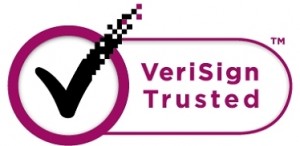Did you know theSSLstore offers Verisign TrustSeal?????
Note: Seal in Search feature is no longer available now.
The news reports are filled with virus warnings, phishing scams, fake sites and identity theft. All this news has a direct impact on your marketing and sales efforts. It makes consumers leery of all websites and reluctant to enter private or financial data on a site they don’t know well.
According to different studies and research, small businesses (and large businesses) can struggle with creating shopping cart confidence among consumers. Trust Seals can be one way to improve the shopping experience and help consumers complete their purchase in your store. Five things a small business owner can do to inspire trust and confidence include:
-
- Stand out from the competition in search results
In search results, make it easy for visitors to choose your link over your competitor’s. The seal-in-search* plug-in detects VeriSign Trust Seal and displays it next to your link in search results. The VeriSign Trust Seal shows the world that your site has been verified by VeriSign. Learn more: VeriSign Trust Seal FAQ. Download the free AVG LinkScanner browser plug-in to see one example of how the VeriSign Trust Seal is displayed in search results.
-
- Make trust part of your professional identity
10 times as many consumers feel trust is more important than cost when doing business online (VeriSign Brand Tracking Research, 2009). Yet, it can be tough to prove your identity online when you are a small local business and not a household name. A small investment in a VeriSign Seal enhances the professionalism and sense of safety of your Web site, because only a VeriSign Seal is backed by the most trusted security brand on the Internet (VeriSign Brand Tracking Research, 2009).
-
- Show your site is safe and secure
Growing concerns about fake sites, viruses and identity theft have made consumers reluctant to click links on Web sites they don’t know. As a result, small businesses struggle to generate the confidence to buy, click, and sign-in online. The VeriSign Trust Seal shows site visitors that VeriSign has confirmed your identity and your site has passed the VeriSign malware scan, so they can safely proceed.
-
- Protect your reputation and your customers’ loyalty
Malware is a general term for malicious software that hackers install on your site to spread viruses, hijack your computer or steal sensitive data such as credit card numbers or other personal information. Malware is not visible or easily detected, but can wreak havoc on your reputation and may infect your customers’ computer just by browsing your Web site. VeriSign Trust Seal includes a daily malware scan to detect malware and alert you to respond quickly to the attack.
-
- Display the #1 trust mark on the Internet
On average, the VeriSign Seal is displayed 250 million times a day on more than 90,000 Web sites in 160 countries. In fact, 97 of the 100 largest SSL-using banks in the world, 87% of the largest ecommerce sites in North America and 93% of the Fortune 500 rely on VeriSign (including VeriSign, its subsidiaries and affiliates) to secure their Web sites. As the brand trusted by major banks and retailers, the VeriSign Seal helps build confidence for increased loyalty on all types of Web sites.





































![A Look at 30 Key Cyber Crime Statistics [2023 Data Update]](https://www.thesslstore.com/blog/wp-content/uploads/2022/02/cyber-crime-statistics-feature2-75x94.jpg)












5 Ways to Determine if a Website is Fake, Fraudulent, or a Scam – 2018
in Hashing Out Cyber SecurityHow to Fix ‘ERR_SSL_PROTOCOL_ERROR’ on Google Chrome
in Everything EncryptionRe-Hashed: How to Fix SSL Connection Errors on Android Phones
in Everything EncryptionCloud Security: 5 Serious Emerging Cloud Computing Threats to Avoid
in ssl certificatesThis is what happens when your SSL certificate expires
in Everything EncryptionRe-Hashed: Troubleshoot Firefox’s “Performing TLS Handshake” Message
in Hashing Out Cyber SecurityReport it Right: AMCA got hacked – Not Quest and LabCorp
in Hashing Out Cyber SecurityRe-Hashed: How to clear HSTS settings in Chrome and Firefox
in Everything EncryptionRe-Hashed: The Difference Between SHA-1, SHA-2 and SHA-256 Hash Algorithms
in Everything EncryptionThe Difference Between Root Certificates and Intermediate Certificates
in Everything EncryptionThe difference between Encryption, Hashing and Salting
in Everything EncryptionRe-Hashed: How To Disable Firefox Insecure Password Warnings
in Hashing Out Cyber SecurityCipher Suites: Ciphers, Algorithms and Negotiating Security Settings
in Everything EncryptionThe Ultimate Hacker Movies List for December 2020
in Hashing Out Cyber Security Monthly DigestAnatomy of a Scam: Work from home for Amazon
in Hashing Out Cyber SecurityThe Top 9 Cyber Security Threats That Will Ruin Your Day
in Hashing Out Cyber SecurityHow strong is 256-bit Encryption?
in Everything EncryptionRe-Hashed: How to Trust Manually Installed Root Certificates in iOS 10.3
in Everything EncryptionHow to View SSL Certificate Details in Chrome 56
in Industry LowdownPayPal Phishing Certificates Far More Prevalent Than Previously Thought
in Industry Lowdown